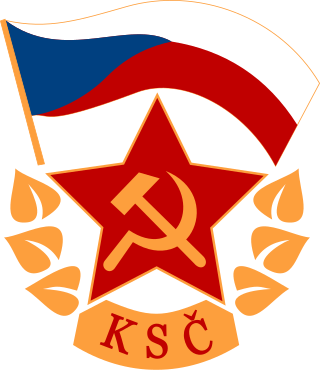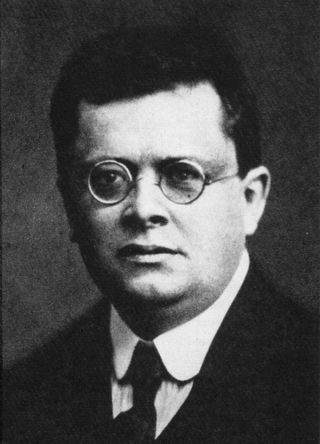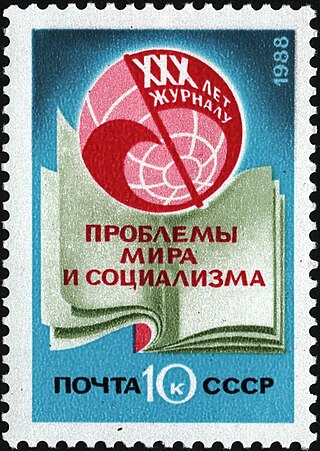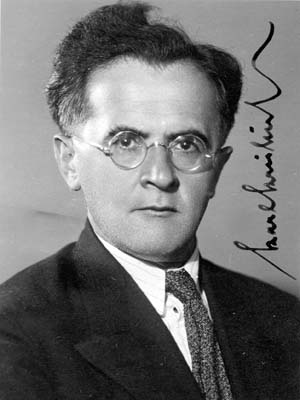Related Research Articles

The Communist Party of Czechoslovakia was a communist and Marxist–Leninist political party in Czechoslovakia that existed between 1921 and 1992. It was a member of the Comintern. Between 1929 and 1953, it was led by Klement Gottwald. The KSČ was the sole governing party in the Czechoslovak Socialist Republic though it was a leading party along with the Slovak branch and four other legally permitted non-communist parties. After its election victory in 1946, it seized power in the 1948 Czechoslovak coup d'état and established a one-party state allied with the Soviet Union. Nationalization of virtually all private enterprises followed, and a command economy was implemented.

Antonín Zápotocký was a Czech communist politician and statesman in Czechoslovakia. He served as the Prime Minister of Czechoslovakia from 1948 to 1953, and then as President of Czechoslovakia from 1953 to 1957.

The Communist Workers' Party of Germany was an anti-parliamentarian and left communist party that was active in Germany during the Weimar Republic. It was founded in 1920 in Heidelberg as a split from the Communist Party of Germany (KPD). Originally the party remained a sympathising member of Communist International. In 1922, the KAPD split into two factions, both of whom kept the name, but are referred to as the KAPD Essen Faction and the KAPD Berlin Faction.

The Communist Workers' International or Fourth Communist International was a council communist international. It was founded around the Manifesto of the Fourth Communist International, published by the Communist Workers' Party of Germany (KAPD) in 1921.

Bohumír Šmeral was a Czech politician, leader of the Czech Social Democratic Party, and one of the founders of the Communist Party of Czechoslovakia.

The German Social Democratic Workers' Party in the Czechoslovak Republic was a German social democratic party in Czechoslovakia, founded when the Bohemian provincial organization of the Social Democratic Workers' Party of Austria separated itself from the mother party. The founding convention was held in Teplice from 30 August – 3 September 1919; the first leader of the party was Josef Seliger.
Paul Frölich was a German journalist and author. As a left-wing political activist, he was a founding member of the Communist Party of Germany (KPD) and founder of the party's paper, Die Rote Fahne. A KDP deputy in the Reichstag on two occasions, Frölich was expelled from the party in 1928, after which he joined the organized German Communist Opposition movement. Frölich is best remembered as a biographer of Rosa Luxemburg.

Communist Workers' Party of Bulgaria was a council communist party in the Kingdom of Bulgaria. It was founded in September 1921, and was modelled after the Communist Workers' Party of Germany. It was founded at a conference in the city of Slivnu, a centre of the textile industry, from the 7th until the 10th January 1922. The leadership of the party was based in Varna. The party had around 1000 members, and published Rabotchnik Iskra. The party was affiliated to the Communist Workers' International.

The Marxist Left in Slovakia and the Transcarpathian Ukraine was a political organisation in eastern parts of the First Czechoslovak Republic. It was one of the forerunners of the Communist Party of Czechoslovakia.

Polish Socialist Workers Party was a political party in Czechoslovakia founded in February 1921, based amongst Polish workers. The party was active in trade union struggles, mainly mobilizing miners and workers in heavy industries. The chairman of the party was Emanuel Chobot. Other prominent members of the party were Antoni Steffek and Wiktor Sembol. The party closely cooperated with the Czechoslovak Social Democratic Party. The party published the newspaper Robotnik Śląski from Fryštát.
The German Socialist Labour Party of Poland was a political party organizing German Social Democrats in interbellum Poland.

Problems of Peace and Socialism, also commonly known as World Marxist Review (WMR), the name of its English-language edition, was a monthly theoretical journal containing jointly-produced content by Communist and workers' parties from around the world, published from September 1958 to June 1990.
The Hungarian-German Social Democratic Party was a social democratic political party in Slovakia. It was founded in 1919 by social democrats from ethnic minority communities. The party had a German and a Hungarian section. The German and Hungarian social democrats in Slovakia had developed an antagonistic relationship with the Slovak social democrats, who had merged into the Czechoslovak Social Democratic Workers Party as Austria-Hungary was broken up after the First World War. Issues of contention between Hungarian/German and Slovak social democrats included views of the February Strike of 1919 and the Hungarian Soviet Republic.
Kommunistische Montags-Zeitung was a weekly newspaper published by the Greater Berlin District of the Communist Workers Party of Germany 1920–1921. It was published instead of Kommunistische Arbeiter-Zeitung (KAZ) on Mondays. Kunze, who also edited KAZ, edited the newspaper.
Karl Čermak was a German socialist politician. A skilled organizer, Čermak emerged as a key leader of the labour movement in German Bohemia in the years preceding World War I. He went on to become a parliamentarian in the First Czechoslovak Republic.
The Communist Party of Czechoslovakia (Opposition) (Czech: Komunistická strana Československa (opozice), German: Kommunistischen Partei der Tschechoslowakei (Opposition)), or simply the Communist Opposition, was a political party in Czechoslovakia 1929-1938, which was aligned with the Right Opposition in the international communist movement. During its early phase the Communist Opposition had a significant role in leading trade unions, but over time the influence of the group declined and by 1932 the majority of the group merged into the Social Democratic Workers Party.
The Union of Communist Groups was a communist organization in Czechoslovakia, led by Stanislav Kostka Neumann.

Karl Kreibich, also known as Karel Kreibich, was a Sudeten German communist politician and author in Czechoslovakia. Kreibich emerged as the main leader of the revolutionary socialist movement amongst German workers in Bohemia after the First World War. He was a leader of the Communist Party of Czechoslovakia and a functionary of the Communist International. During the First Czechoslovak Republic, he was elected to parliament thrice. During the Second World War he was part of the exiled Czechoslovak State Council, based in London. After the war he served as Czechoslovak ambassador to the Soviet Union.

The 3rd World Congress of the Communist International (Comintern) was held in Moscow on 22 June–12 July 1921. The third official meeting of the Communist International included delegations from more than 50 different national structures and took place in the back-drop of two major events; the failure of the German revolution and the introduction of New Economic Policy in Soviet Russia.
The Jewish Communist Party in the Czechoslovak Republic was a short-lived political party in Czechoslovakia.
References
- 1 2 3 4 5 6 Thomas Keller (October 2012). Emil Franzel (1901 ? 1976): Biografie eines sudetendeutschen Intellektuellen. Diplomica Verlag. p. 25. ISBN 978-3-8428-8726-8.
- 1 2 3 4 5 6 Ladislav Cabada; Zdenek Benedikt (14 September 2010). Intellectuals and the Communist Idea: The Search for a New Way in Czech Lands from 1890 to 1938. Lexington Books. pp. 59, 65. ISBN 978-0-7391-4378-0.
- ↑ Jörg Kracik (1999). Die Politik des deutschen Aktivismus in der Tschechoslowakei, 1920-1938. P. Lang. p. 96. ISBN 978-3-631-34672-3.
- 1 2 3 Germany (West). Bundesinstitut zur Erforschung des Marxismus-Leninismus (1965). Dokumente zum Studien des Kommunismus. p. 104.
- 1 2 3 4 5 6 7 Wissenschaftliche Zeitschrift der Friedrich-Schiller-Universität Jena: Gesellschafts- und sprachwissenschaftliche Reihe. Friedrich-Schiller-Universität. 1957. pp. 536, 540.
- ↑ Heike van Hoorn (2004). Neue Heimat im Sozialismus: die Umsiedlung und Integration sudetendeutscher Antifa-Umsiedler in die SBZ/DDR. Klartext. p. 37. ISBN 978-3-89861-241-8.
- 1 2 3 Nancy M. Wingfield (1989). Minority Politics in a Multinational State: The German Social Democrats in Czechoslovakia, 1918-1938. East European Monographs. p. 31. ISBN 978-0-88033-156-2.
- ↑ Grigory Yevseyevich Zinovyev (1921). Die Kommunistische Internationale. p. 374.
- ↑ Leo Stern (1969). Archivalische Forschungen zur Geschichte der deutschen Arbeiterbewegung. Topos Verlag AG. p. 2066.
- 1 2 Klaus Sator (1996). Anpassung ohne Erfolg. Wissenschaftliche Buchgesellschaft. p. 57. ISBN 978-3-534-12925-6.
- ↑ Berichte des Bundesinstituts für Östwissenschaftliche und Internationale Studien. Bundesinstitut für Östwissenschaftliche und Internnationale Studien. 1974. p. 16.
- ↑ Protokoll des III. Kongresses der Kommunistischen Internationale (Moskau, 22. Juni bis 12. Juli 1921). Feltrinelli Reprint. 1967. p. 411.
- ↑ Ladislav Cabada; Zdenek Benedikt (2010-09-14). Intellectuals and the Communist Idea: The Search for a New Way in Czech Lands from 1890 to 1938. Lexington Books. p. 63. ISBN 978-0-7391-4378-0.
- 1 2 3 Wissenschaftlicher Dienst für Ostmitteleuropa. Johann Gottfried Herder-Institut. 1971. p. 450.